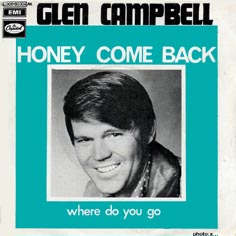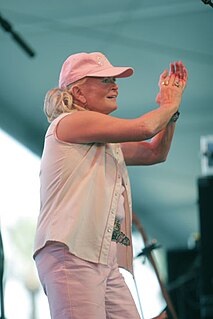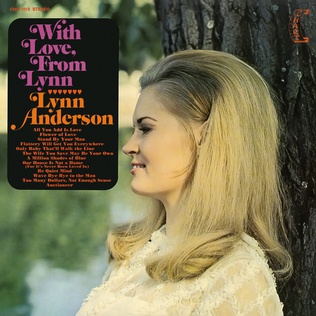Related Research Articles
"I Can't Wait Any Longer" is a single by American country music artist Bill Anderson. Released in April 1978, it was the first single from his album Love and Other Sad Stories. The song peaked at number 4 on the Billboard Hot Country Singles chart. It also reached number 1 on the RPM Country Tracks chart in Canada.
"Talkin' to the Wall" is a single originally recorded by country singer Warner MacPherson. He co-wrote it with Bill Montague. It became a top ten hit for him when the song peaked at No. 3 in the Country Singles chart in 1966.
"Hey Loretta" is a single by American country music artist Loretta Lynn. Released in October 1973, it was the second single from her album Love Is the Foundation. The song peaked at number 3 on the Billboard Hot Country Singles chart. It also reached number 1 on the RPM Country Tracks chart in Canada.
"Any Old Wind That Blows" is a song recorded by American country music artist Johnny Cash. It was released in November 1972 as the third single from his album Any Old Wind That Blows. The song peaked at number 3 on the Billboard Hot Country Singles chart. It also reached number 1 on the RPM Country Tracks chart in Canada. The song was written by Dick Feller.
"Love's the Answer" is a song written by Emily Mitchell and Norro Wilson, and recorded by American country music artist Tanya Tucker. It was released in October 1972 as the second single from her album Delta Dawn. The song peaked at number 5 on the Billboard Hot Country Singles chart. It also reached number 1 on the RPM Country Tracks chart in Canada.
"Fool Me" is a song written by Joe South. South's version was released as a single in 1971 and peaked at number 78 on the Billboard Hot 100.

"Listen to a Country Song" is a song written by Al Garth and Jim Messina. It was originally recorded by Loggins and Messina on their 1971 album Sittin' In. Drummer Merel Bregante is using brushes on his drum kit rather than sticks, which helps to reflect the country feel of the song, Al Garth is playing violin and Michael Omartian is playing both tack piano and grand piano.
"A Stranger in My Place" is a song by Kenny Rogers and Kin Vassy, first recorded on Kenny Rogers & The First Edition's 1970 album Something's Burning. The most successful charting single of the song was by Canadian country pop artist Anne Murray. Released in February 1971, it was the second single from her album Straight, Clean and Simple. It peaked at number 1 on the Canadian RPM Country Tracks chart. It also reached number 27 on the Billboard Hot Country Singles chart in the United States.

"Honey Come Back" is a song written by Jimmy Webb, and recorded by the American country music artist Glen Campbell. It was released in January 1970 as the second single from his album Try a Little Kindness. The song peaked at number 2 on the Billboard Hot Country Singles chart. It also reached number 1 on the RPM Country Tracks chart in Canada.
"Happy State of Mind" is a single by American country music artist Bill Anderson. Released in July 1968, it was the first single from his album Happy State of Mind. The song peaked at number 2 on the Billboard Hot Country Singles chart. It also reached number 1 on the RPM Country Tracks chart in Canada.
"Wild Week-End" is a single by American country music artist Bill Anderson. Released in March 1968, it was the first single from his album Wild Weekend. The song peaked at number 2 on the Billboard Hot Country Singles chart. It also reached number 1 on the RPM Country Tracks chart in Canada.

Bill is a studio album by American country singer-songwriter Bill Anderson. It was released in July 1973 on MCA Records and was produced by Owen Bradley. It was Anderson's first studio album to be released on the MCA label after Decca Records merged with the label. It was also his twenty first studio recording to be released and only album project to be issued in 1973. The album included three singles, two of which became number one hits in either the United States and Canada. The album itself also would reach peak positions on national publication charts.

Billy Boy & Mary Lou is a studio album by American country music artists Bill Anderson and Mary Lou Turner. It was released in June 1977 on MCA Records and was produced by Buddy Killen. It was the duo's second studio album together since pairing up as a duet team in the mid 1970s. The album produced two singles between 1977 and 1978. It would be the duo's final studio album together.

The singles discography of American country music artist Lynn Anderson contains 72 singles, three promotional singles, one charting B-side, two music videos and nine other song appearances. She signed her first recording contract with Chart Records in 1966. The following year, her single "Ride, Ride, Ride" debuted on the Billboard Hot Country Singles chart. Also in 1967, her single "If I Kiss You " became her first major hit when it reached number five on the country singles chart. Anderson had a series of hits that reached the top ten and 20 during the 1960s including "Promises, Promises" (1969), "No Another Time" (1968), "Big Girls Don't Cry" (1968) and "That's a No No" (1969).
"Sing About Love" is a song written by Glenn Sutton. It was recorded by American country music artist Lynn Anderson and released as a single in 1973 via Columbia Records.
"Smile for Me" is a song written by Rory Bourke. It was recorded by American country music artist Lynn Anderson and released as a single in February 1974 via Columbia Records.

With Love, from Lynn is a studio album released by American country artist Lynn Anderson. It was released in March 1969 via Chart Records and was produced by Slim Williamson. Her fourth studio release, With Love from Lynn contained 12 tracks. Two of these tracks were singles that became major hits for Anderson between 1968 and 1969. The album itself was successful after charting on the Billboard country albums survey.
"If You Can Live with It " is a song written and recorded by American country singer-songwriter Bill Anderson. It was released as a single in 1973 via MCA Records and became a major hit the same year.
"Where Are You Going, Billy Boy" is a song written by Dave Kirby and Glenn Martin. It was first recorded as a duet by American country artists Bill Anderson and Mary Lou Turner. It was released as a single in 1977 via MCA Records and became a major hit the same year.

The singles discography of American country singer-songwriter Bill Anderson contains 84 singles, three promotional singles, 6 other charted songs and four music videos. After signing to Decca Records in 1958, Anderson released a series of early singles that became hits, reaching the top ten and 20. This included "That's What It's Like to Be Lonesome" (1958), "The Tip of My Fingers" (1960) and "Po' Folks" (1961). The following year, he reached number one on the Billboard Country and Western Sides chart with "Mama Sang a Song." In 1963, Anderson released his most commercially successful single, "Still." The song was his second number one country single and his first top ten hit on the Billboard Hot 100, climbing to number eight. His follow-up single, "8×10" reached similar crossover success. Anderson released 11 more top ten country hits during the rest of the decade. This included the number one singles "I Get the Fever" (1966) and "My Life " (1969). He also had a number one hit with Jan Howard called "For Loving You" in 1968. Anderson also had top ten hits with "I Love You Drops" (1965), "Happy State of Mind" (1968) and a cover of "But You Know I Love You" (1969).
References
- ↑ "Bill Anderson singles". Allmusic . Retrieved 18 March 2011.
- ↑ "RPM Country Singles for September 29, 1973". RPM . Retrieved 18 March 2011.
| | This 1970s country song–related article is a stub. You can help Wikipedia by expanding it. |